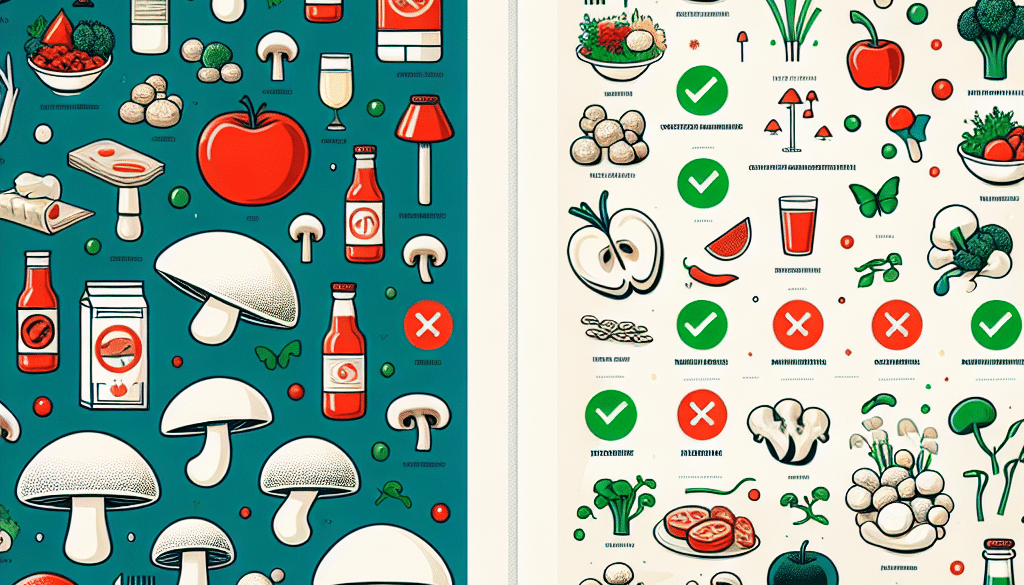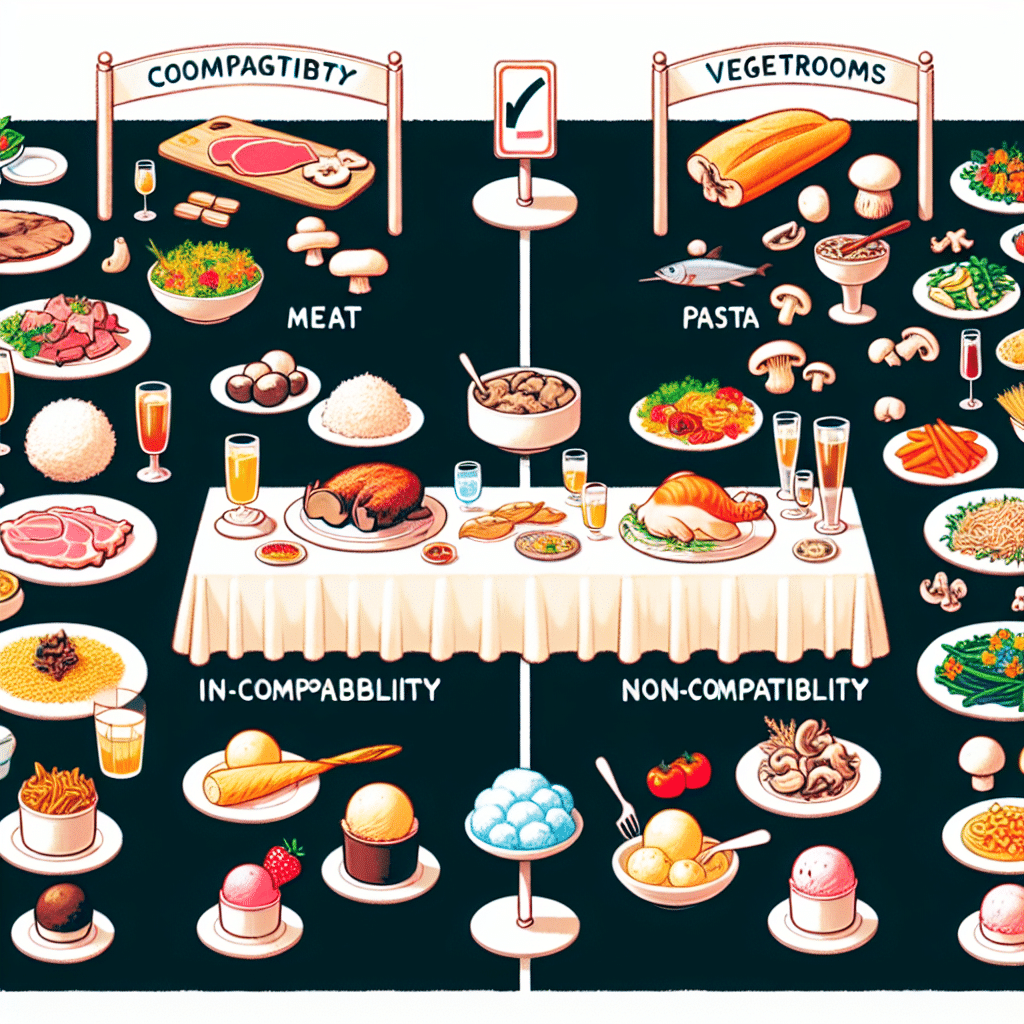Which food Cannot be eaten with mushroom?
-
Table of Contents
- Mushroom Consumption: Foods to Avoid for Optimal Health
- Understanding Mushroom Combinations
- Food Pairings to Avoid with Mushrooms
- Chemical Interactions and Mushrooms
- Specific Foods and Chemical Concerns
- Personal Dietary Restrictions and Mushrooms
- Considerations for Specific Diets
- Case Studies and Research Findings
- Examples of Research on Mushroom Pairings
- Conclusion: Making Smart Choices with Mushrooms
- Discover ETChem’s Protein Products
Mushroom Consumption: Foods to Avoid for Optimal Health
Mushrooms are a versatile and nutritious addition to many dishes, offering a range of health benefits and a unique umami flavor. However, when incorporating mushrooms into your diet, it’s important to be aware of certain food combinations that may not be advisable. This article explores which foods should not be eaten with mushrooms and the reasons behind these dietary recommendations.
Understanding Mushroom Combinations
While mushrooms can be a healthy part of your diet, combining them with certain foods may lead to discomfort or adverse reactions. It’s essential to consider the digestive process, potential chemical interactions, and personal dietary restrictions when pairing mushrooms with other foods.
Food Pairings to Avoid with Mushrooms
- Alcohol: Consuming mushrooms with alcohol can cause discomfort as both can be taxing on the liver and digestive system.
- Dairy Products: Some individuals may find that combining mushrooms with dairy leads to bloating and indigestion due to the differing digestion rates of the two.
- Complex Carbohydrates: Foods like bread or pasta may compete with mushrooms for digestive enzymes, potentially leading to indigestion.
Chemical Interactions and Mushrooms
Chemical interactions between mushrooms and other foods can also influence which pairings to avoid. For example, certain types of mushrooms contain natural chemicals that may interact with common ingredients, altering their effects or leading to discomfort.
Specific Foods and Chemical Concerns
- Beans and Legumes: These can cause gas and bloating when eaten with mushrooms due to their high fiber content.
- High-Iodine Foods: Foods rich in iodine, such as seaweed, can potentially interact with some mushrooms, affecting thyroid function.
- Red Meat: The combination of red meat and mushrooms may be heavy on the digestive system, leading to sluggishness and indigestion.
Personal Dietary Restrictions and Mushrooms
Individual dietary restrictions or sensitivities can also dictate which foods to avoid with mushrooms. For instance, those with a histamine intolerance may need to be cautious about mushroom varieties and their accompaniments.
Considerations for Specific Diets
- Low-Histamine Diet: Certain mushroom types may be high in histamines, which can exacerbate symptoms in sensitive individuals.
- Anti-Inflammatory Diet: While mushrooms have anti-inflammatory properties, pairing them with pro-inflammatory foods like processed meats can negate these benefits.
- Low-FODMAP Diet: Some mushrooms are high in FODMAPs and should be avoided by those with IBS or similar gastrointestinal issues.
Case Studies and Research Findings
Scientific research has provided insights into the best dietary practices involving mushrooms. Studies have shown that certain combinations can affect nutrient absorption and digestion, emphasizing the importance of mindful food pairing.
Examples of Research on Mushroom Pairings
- A study on alcohol and mushroom consumption highlighted the increased burden on the liver when these are consumed together.
- Research on the digestion of mushrooms and dairy products has shown that the different protein structures can lead to digestive challenges.
- Investigations into the anti-inflammatory properties of mushrooms suggest that combining them with inflammatory foods may reduce their health benefits.
Conclusion: Making Smart Choices with Mushrooms
In conclusion, while mushrooms are a nutritious food choice, it’s important to be mindful of what you pair them with. Avoiding alcohol, dairy, complex carbohydrates, beans, high-iodine foods, and red meat can help prevent discomfort and maximize the health benefits of mushrooms. Additionally, considering personal dietary restrictions and sensitivities is crucial for optimal health outcomes. By making informed choices about mushroom pairings, you can enjoy their flavor and nutritional advantages without negative side effects.
Discover ETChem’s Protein Products
If you’re looking to enhance your diet with high-quality protein options, consider exploring ETChem’s range of collagen products. Their extensive selection caters to various dietary needs and preferences, ensuring you can find the perfect addition to your health regimen.
About ETChem:
ETChem, a reputable Chinese Collagen factory manufacturer and supplier, is renowned for producing, stocking, exporting, and delivering the highest quality collagens. They include marine collagen, fish collagen, bovine collagen, chicken collagen, type I collagen, type II collagen and type III collagen etc. Their offerings, characterized by a neutral taste, instant solubility attributes, cater to a diverse range of industries. They serve nutraceutical, pharmaceutical, cosmeceutical, veterinary, as well as food and beverage finished product distributors, traders, and manufacturers across Europe, USA, Canada, Australia, Thailand, Japan, Korea, Brazil, and Chile, among others.
ETChem specialization includes exporting and delivering tailor-made collagen powder and finished collagen nutritional supplements. Their extensive product range covers sectors like Food and Beverage, Sports Nutrition, Weight Management, Dietary Supplements, Health and Wellness Products, ensuring comprehensive solutions to meet all your protein needs.
As a trusted company by leading global food and beverage brands and Fortune 500 companies, ETChem reinforces China’s reputation in the global arena. For more information or to sample their products, please contact them and email karen(at)et-chem.com today.





